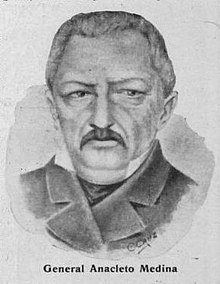Anacleto Medina
This article has multiple issues. Please help improve it or discuss these issues on the talk page. (Learn how and when to remove these messages)
|
Anacleto Medina | |
|---|---|
 | |
| Personal details | |
| Born | 1788 Colonia, Uruguay |
| Died | July 17, 1871 Manantiales de San Juan, Colonia, Uruguay |
| Occupation | army caudillo revolutionary politician |
| Profession | military man |
| Military service | |
| Allegiance | |
| Years of service | 1820-1871 |
| Rank | Brigadier General |
| Battles/wars | Battle of Cepeda Martín Rodríguez campaigns Battle of Camacuá Battle of Ituzaingó Battle of the Vizcacheras Battle of Carpintería Battle of Cagancha Battle of Caaguazú Battle of Arroyo Grande Battle of Caseros Battle of Sauce Battle of Paso Severino Battle of Manantiales |
Anacleto Medina (1788 – July 17, 1871) was a Uruguayan soldier, politician and caudillo who participated in the Brazilian War, the Argentine Civil War and the Guerra Grande in the Banda Oriental.[1][failed verification] He served in the Federal Army in the Unitary Army, and also in the Colorados and Blancos armies, during the Uruguayan Civil War.[2][irrelevant citation]
Born in Las Víboras, Colonia Department, Uruguay, he was the son of Luis Bernardo Medina, born in Santiago del Estero, Argentina, and Petrona Biera, belonging to a Creole family from the Banda Oriental.[3][failed verification]
During his military career he was under the command of the main military leaders, including Francisco Ramírez,[4][failed verification] Juan Lavalle, Fructuoso Rivera,[5] Justo José de Urquiza and Ricardo López Jordán. He died assassinated after the defeat of Manantiales, event occurred on July 17, 1871.[6][failed verification]
References
[edit]- ^ La revolucion oriental de 1870, Volumen1. Abdon Arozteguy. 1889.
- ^ El acuerdo de flores: trabajo leido en la "Comisión de Estudios Históricos de San José de Flores" el 11 de noviembre 1938. Antonio Sagarna. 1938.
- ^ La estancia de Dn. Juan de Narbona: historia de una estancia colonial. Luis Morquio Blanco. 1990.
- ^ El general don Francisco Ramírez: fe de bautismo de la democracia y piedra angular del federalismo. Leandro Ruíz Moreno. 1955.
- ^ Registro Rivera. Fructuoso Rivera. 1941.
- ^ Las montoneras de López Jordán: Historia novelada de las rebeliones jordanistas en Entre Ríos y las de los "blancos" en el Uruguay, desde el asesinato del general Urquiza al de López Jordán, 1870-1889. Francisco I. Schauman. 1968.
